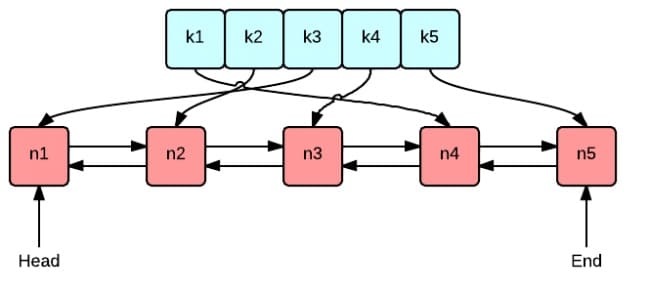1. LRU 淘汰策略
...大约 4 分钟
https://github.com/dreamjz/golang-notes/tree/main/books/7-days-golang/GeeCache/day1-lru
\DAY1-LRU
│ go.mod
│
└─lru
lru.go
lru_test.go
1. 缓存淘汰算法
缓存数据全部存储在内存之中,内存资源是有限的,需要在特定的场合下删除某些数据以释放资源。
1.1 FIFO(First In First Out)
FIFO(先入先出)策略,最先加入缓存的数据最先被删除。使用队列即可实现。
缺点:某些数据虽然较早加入缓存,但是使用频率比较高,若被删除则会导致缓存命中率降低。
1.2 LFU(Least Frequently Used)
最不经常使用(最少使用),淘汰缓存中访问频率最低的数据。
优点:缓存命中率高
缺点:
- 需要额外内存,维护每个记录的访问次数
- 访问模式发生变化,需要较长时间适应,收到历史数据影响较大
1.3 LRU(Least Recently Used)
最近最少使用,相对平衡的算法。若数据最近被访问,则未来被访问的概率就更高。
2. LRU 算法实现
2.1 数据结构
LRU 算法数据结构为哈希表和双向链表的组合。

- 哈希表存储键值对(key, value),查找操作时间复杂度 O(1)
- 值(value)之间相连形成双向链表
- 移动节点到队尾(首)时间复杂度为 O(1)
- 新增节点到队尾(首)时间复杂度为 O(1)
- 删除节点复杂度为 O(1)
// Cache is LRU cache. It is not safe for concurrent cases.
type Cache struct {
maxBytes int64
nBytes int64
dl *list.List // doubly linked list
cache map[string]*list.Element
// optional and executed when an entry is purged
OnEvicted func(key string, value Value)
}
type entry struct {
key string
value Value
}
type Value interface {
Len() int
}
Cache:maxBytes:允许使用的最大内存nBytes:当前已使用的内存dl:标准库的双向链表list.Listcache:LRU 缓存OnEvicted:删除数据时的回调函数
entry:双向链表节点的数据类型Value:接口,定义值的通用类型;Len:返回值占用的内存大小
func New(maxBytes int64, onEvicted func(string, Value)) *Cache {
return &Cache{
maxBytes: maxBytes,
dl: list.New(),
cache: make(map[string]*list.Element),
OnEvicted: onEvicted,
}
}
// Len return the number of cache entries
func (c *Cache) Len() int {
return c.dl.Len()
}
New用于实例化Cache,Len获取节点数量。
2.2 查找
此处约定队尾节点为最近最少使用的节点。
查找操作流程:
- 通过 key 寻找对应的节点
- 将节点移动至队首
// Get find key's value
func (c *Cache) Get(key string) (Value, bool) {
if ele, ok := c.cache[key]; ok {
c.dl.MoveToFront(ele)
kv := ele.Value.(*entry)
return kv.val, true
}
return nil, false
}
2.3 删除
删除最近最少使用的节点,即队首节点。
// RemoveOldest remove the oldest item
func (c *Cache) RemoveOldest() {
ele := c.dl.Back()
if ele != nil {
c.dl.Remove(ele)
kv := ele.Value.(*entry)
delete(c.cache, kv.key)
c.nBytes -= int64(len(kv.key)) + int64(kv.val.Len())
if c.OnEvicted != nil {
c.OnEvicted(kv.key, kv.val)
}
}
}
- 获取队首节点并删除
- 从哈希表中删除对应的键值对
- 更新使用的内存大小
- 若存在回调函数,则调用
2.4 插入/更新
若键值对存在,则更新,否则插入。
// Add adds a value to the cache.
func (c *Cache) Add(key string, val Value) {
if ele, ok := c.cache[key]; ok {
c.dl.MoveToFront(ele)
kv := ele.Value.(*entry)
c.nBytes += int64(val.Len()) - int64(kv.val.Len())
kv.val = val
} else {
ele := c.dl.PushFront(&entry{key, val})
c.cache[key] = ele
c.nBytes += int64(len(key)) + int64(val.Len())
}
for c.maxBytes != 0 && c.maxBytes < c.nBytes {
c.RemoveOldest()
}
}
- 查找 key:
- 若不存在
- 将节点添加至队首
- 键值对添加至哈希表
- 更新使用的内存大小
- 存在
- 将节点移动至队首
- 修改哈希表的 value
- 更新使用的内存大小
- 若不存在
- 若使用的内存大小超过限制,则删除队尾节点(最近最少使用);
maxBytes为 0 表示无限制
3. 测试
3.1 测试新增和获取
type String string
func (s String) Len() int {
return len(s)
}
func TestGet(t *testing.T) {
lru := New(int64(0), nil)
lru.Add("key1", String("1234"))
if v, ok := lru.Get("key1"); !ok || string(v.(String)) != "1234" {
t.Errorf("cache hit key1=1234 failed")
}
if _, ok := lru.Get("key2"); ok {
t.Errorf("cache miss key2 failed")
}
}
3.2 测试缓存淘汰
func TestRemoveoldest(t *testing.T) {
k1, k2, k3 := "key1", "key2", "k3"
v1, v2, v3 := "value1", "value2", "v3"
cap := len(k1 + k2 + v1 + v2)
lru := New(int64(cap), nil)
lru.Add(k1, String(v1))
lru.Add(k2, String(v2))
lru.Add(k3, String(v3))
if _, ok := lru.Get("key1"); ok || lru.Len() != 2 {
t.Fatalf("Removeoldest key1 failed")
}
}
3.3 测试回调函数
func TestOnEvicted(t *testing.T) {
keys := make([]string, 0)
callback := func(key string, value Value) {
keys = append(keys, key)
}
lru := New(int64(10), callback)
lru.Add("key1", String("123456"))
lru.Add("k2", String("k2"))
lru.Add("k3", String("k3"))
lru.Add("k4", String("k4"))
expect := []string{"key1", "k2"}
if !reflect.DeepEqual(expect, keys) {
t.Fatalf("Call OnEvicted failed, expect keys equals to %s", expect)
}
}
Reference
Powered by Waline v2.15.2
